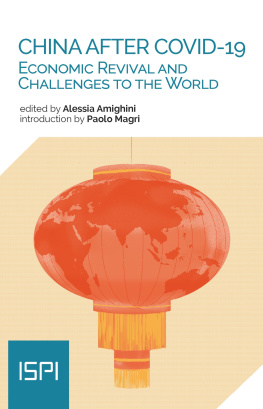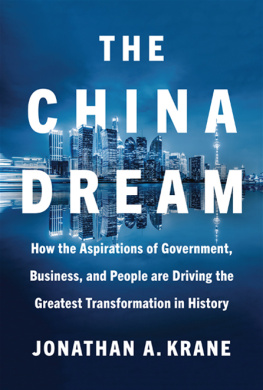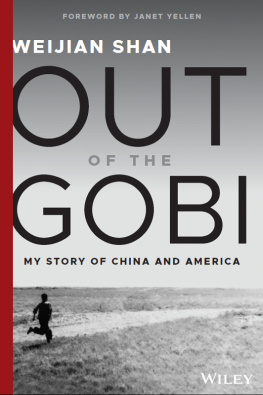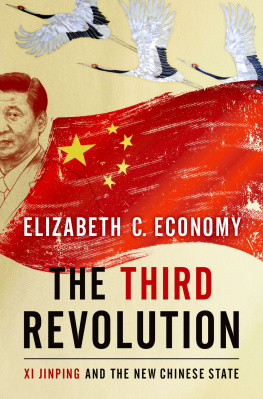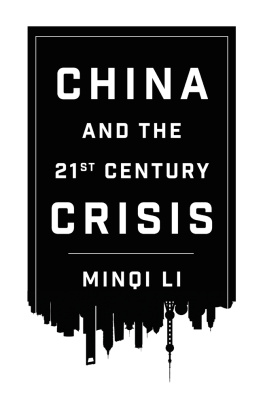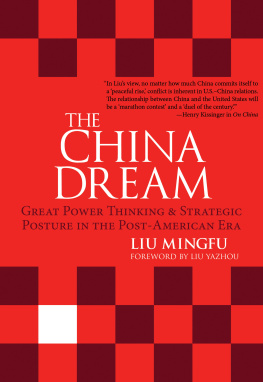The China Dream
The China Dream
The Quest for the Last Great
Untapped Market on Earth
Joe Studwell

Copyright 2002, 2003, 2005 by Joe Studwell
All rights reserved. No part of this book may be reproduced in any form or by any electronic or mechanical means, or the facilitation thereof, including information storage and retrieval systems, without permission in writing from the publisher, except by a reviewer, who may quote brief passages in a review. Any members of educational institutions wishing to photocopy part or all of the work for classroom use, or publishers who would like to obtain permission to include the work in an anthology, should send their inquiries to Grove/Atlantic, Inc., 841 Broadway, New York, NY 10003.
First published in Great Britain in 2002 by
Profile Books Ltd., London, England
Published simultaneously in Canada
Printed in the United States of America
This edition includes an updated and revised epilogue.
Library of Congress Cataloging-in-Publication Data
Studwell, Joe.
The China dream : the quest for the last great untapped market on earth/Joe Studwell.
p. cm.
Includes bibliographical references.
eBook ISBN-13: 978-0-8021-9928-7
1. ChinaEconomic policy2000- 2. ChinaEconomic conditions2000- 3. Economic forecastingChina. 4. ChinaCommercial policy. 5. Investments, ForeignChina. 6. ChinaForeign economic relations. I. Title.
HC427.95 .S78 2002
330.951dc21
2001058996
Designed by MacGuru
Grove Press
an imprint of Grove/Atlantic, Inc.
841 Broadway
New York, NY 10003
Distributed by Publishers Group West
www.groveatlantic.com
For Mirri, who couldnt quite put up with me.
And for Tiffany, my wife, who strangely can.
In this paperback edition of the China Dream the last four chapters have been updated to take account of events that occurred and economic data that were released in the course of 2002. An epilogue has been added. This was written following a series of interviews with ministers in Beijing and the conclusion of the 16th Chinese Communist Party congress in November 2002.
Preface
Nothing is required, and nothing will avail, but a little clear thinking
John Maynard Keynes, Collected Writings
THIS IS A book for anyone who wonders why some developing countries become rich while others remain poor. It is also a book about why businessmen, in trying to pick between winners and losers, are mesmerised by some markets but left cold by others. For 700 years, ever since outsiders first started writing about the place, the western world has believed that there are untold riches to be garnered in China. In the thirteenth century, Marco Polo described the country with unrestrained awe; in the fifteenth century, Christopher Columbus set out from Europe to bring home its bounty; in the eighteenth century, the emergent British empire looked on China as the ultimate destination for its maritime trade routes. Over the past 150 years, with the rise of globalisation, the belief in Chinas unparalleled potential has taken on the order of an obsession. That obsession reached a peak in the last decade of the twentieth century, when $300 billion of foreign capital flowed into the country. The investment was of a magnitude different from anything seen previously, but it was still chasing the same end what this book calls the China Dream.
No other large developing country captures the same attention. India and Indonesia are remarked on less, and usually for their perceived disinclination to escape poverty. Brazil, courted briefly by international business in the 1970s, still has the words of former French president Charles de Gaulle ringing in its ears: It is, he said, a country of great potential, and always will be. Even the Japanese, who did manage to haul themselves into the ranks of the leading nations in the early twentieth century, achieved this against the expectations of most outsiders. It was only Japans rapid growth, modernisation and naval defeat of Russia in 1905 that persuaded the Great Powers to take her seriously. China has never had this problem. The importance of her supposedly vast markets has been trumpeted for centuries. No nation in history has ever been promoted as a surer bet for investment returns.
Yet history also teaches that time and again China has failed to fulfil the promise that foreigners ascribe to her. For centuries, businessmen have gambled their capital on buying camel trains, chartering ships, building railways and financing highways in their efforts to open up the Chinese market, only to face disappointment. Perplexed by a nation that has imported only a fraction of what would be expected from such a huge, populous country, entrepreneurs have tried to sell every service or type of goods imaginable in the hope of unlocking the collective Chinese wallet. At each setback, and for each successive wave of traders from the earliest European naval powers (Spain and Portugal), to their north European successors (Holland and Britain), to Russia, America and, in the run up to Chinas communist revolution of 1949, the entire developed capitalist world in unison the China Dream has retained extraordinary potency.
The measure of this potency was put into stark relief in the 1990s. It was a decade when transnational investment flows increased by multiples. In part this reflected the development of a global financial system, allowing capital gathered in one place to be moved faster and more freely to others in search of greater profit. Cross-border investment also mushroomed because of political and technological changes, rooted in the 1980s, that opened up an unprecedented stock of investment opportunities around the world. Soviet communism collapsed, apartheid and international isolation ended in South Africa, serious moves were made towards economic liberalisation in Latin America, and in north and south-east Asia investors marvelled at the small, fast-growth countries dubbed Tiger economies. In a case of complementary supply of international capital and demand from deregulating emerging markets the rich world in the 1990s had more money to invest, and more international investment choices, than ever before.
In the face of the myriad investment possibilities on offer, the world seized on two before all others. They were a new dream the internet and China the oldest dream of all. The internet wowed popular imagination with technology. It promised to unite all previously known forms of communication telephony, journalism, audio and video entertainment and commercial and market data in a single medium. Seemingly foreshadowed by the take-off in the use of electronic mail in the mid 1990s, there was an internet gold rush to stake out territory on the world wide web. Everything, it was said from car sales to legal services-would take place in cyberspace. Stock market capitalisations of internet companies with no revenues, let alone profits, shot past those of traditional corporations that had been around for decades. In the light of a revolutionary technology that promised, within a few years, to bring together all mankind in a single market, traditional measures of value lost their significance.
Chinas magnetic appeal to international capital was no less forceful. Despite all the opportunity on offer in the wake of the Cold War in eastern Europe, south-east Asia, Latin America and Africa, only the United States the epicentre of the technology boom managed to suck in more direct foreign investment in the course of the 1990s than the communist giant. Over $300 billion of investment inflows were recorded in the decade, into what remained one of the poorest countries on earth an economy one-seventh the size of Americas, its gross domestic product no more than that of Spain and the Netherlands combined. China had neither the youthful appeal of technology nor the post-Cold War appeal of political reform. But it did not need them. The sales pitch was the same as it had always been the prospect of adding one quarter of the worlds population to a corporations list of potential clients in a single move, the prospect of a market with the statistical potential to become the biggest in the world. In many cases, these propositions were grasped more easily by the middle-aged executives of established multinational companies than was the theory of the internet, whose new-fangled ways were dominated by twenty- and thirty-something entrepreneurs in T-shirts and sneakers. Ultimately, however, the China Dream was the same as the internet dream the promise of exponential market growth, delivered in short order. The fact that the latter came courtesy of a scientific breakthrough, and the former because of an opening to the outside world, was less important. What global investors were drawn to were big ideas and the chimera of fat, fat profits.
Next page

